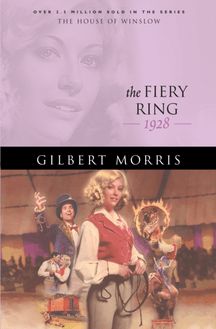Silent Harp (House of Winslow Book #33) , livre ebook
160
pages
English
Ebooks
2004
Vous pourrez modifier la taille du texte de cet ouvrage
Obtenez un accès à la bibliothèque pour le consulter en ligne En savoir plus
Découvre YouScribe et accède à tout notre catalogue !
Découvre YouScribe et accède à tout notre catalogue !
160
pages
English
Ebooks
2004
Vous pourrez modifier la taille du texte de cet ouvrage
Obtenez un accès à la bibliothèque pour le consulter en ligne En savoir plus
Publié par
Date de parution
01 octobre 2004
Nombre de lectures
0
EAN13
9781441270573
Langue
English
Poids de l'ouvrage
1 Mo
Publié par
Date de parution
01 octobre 2004
EAN13
9781441270573
Langue
English
Poids de l'ouvrage
1 Mo
© 2004 by Gilbert Morris
Published by Bethany House Publishers
11400 Hampshire Avenue South
Bloomington, Minnesota 55438
www.bethanyhouse.com
Bethany House Publishers is a division of
Baker Publishing Group, Grand Rapids, Michigan
www.bakerpublishinggroup.com
Ebook edition created 2011
All rights reserved. No part of this publication may be reproduced, stored in a retrieval system, or transmitted in any form or by any means electronic, mechanical, photocopying, recording, or otherwise without the prior written permission of the publisher and copyright owners.
ISBN 978-1-4412-7057-3
Library of Congress Cataloging-in-Publication Data is on file at the Library of Congress, Washington, D.C.
Scripture quotations are from the King James Version of the Bible.
Cover illustration by William Graff
Cover design by Danielle White
TO DOUG PATEK, my friend and brother
Contents
Cover
Title Page
Copyright Page
Dedication
PART ONE
April 1915-November 1918
1. Society Rules
2. “What’s a Home Run?”
3. Meeting the President
4. A Clandestine Romance
5. The Best-Laid Plans
6. A Bit of Metal
PART TWO
February 1922-October 1928
7. The Reluctant Doctor
8. The Camp
9. The Woodchopper
10. “Grandfather Was a Poor Immigrant”
11. A Lord From England
12. When the Sun Goes Out
PART THREE
March-June 1935
13. Clayton Takes a Fall
14. A Knight in Denim
15. Love Is People
16. Out of the Past
17. The Promise
18. The Trouble With Being Rich
PART FOUR
September-October 1935
19. Leland’s Secret
20. Lunch and a Sermon
21. A Time to Love
22. The Open Door
23. The Bride
24. Seana’s Rule
25. A Fitting Finale
About the Author
CHAPTER ONE
Society Rules
“Now that ees what I call a beautiful garment!”
Sharon Winslow gazed at her reflection in the gilt-framed mirror, studying the soft white silk empire-style chemise. She fingered the embroidered yoke of organdy lace and ribbon beading. “It is pretty, Lorraine,” she admitted, a frown creasing her brow. “But I don’t see much point in such fancy underwear. Nobody’s going to see it but you and me.”
Sharon’s petite French maid had not been long in America, and she still thought all things French were better than anything American. At the age of twenty-two, Lorraine Gaban was senior to her mistress by only two years. One glossy black lock of hair escaped the white cap she wore, and her dark eyes snapped as she snorted impatiently, “Ah, but when you have a ’usbund, he will see it, n’est-ce pas ?” She admired her mistress with some pleasure.
Sharon Elizabeth Winslow was not beautiful in the classic sense, but being tall, slender, and well formed, she still attracted admirers. Her glossy brown hair formed a pleasing widow’s peak, and her large brown eyes were expressive. A natural beauty mark graced her right cheek.
Lorraine smiled at her mistress and nodded firmly. “And you will have a ’usbund soon now. Maybe you will meet him at this party what you call it?”
“It’s called a fête. That’s French, isn’t it?”
“Certainement! But what is occasion?”
“My good friend Hannah Astor is getting married.”
“Mais oui, ma’mselle, I remember her. Such a pretty jeune fille. ”
“She’s marrying Charles Fulton, and then they’ll leave on a ship to make the grand tour.”
“I hear this man Fulton ees handsome but poor.”
Sharon allowed the maid to pull a corset on over the silk chemise, and sucking in her breath as Lorraine tied it firmly, she demanded, “How do you hear such things?”
“Oof! What you think we talk about, the servants? We talk about our employers.”
“That doesn’t seem very nice.”
“Who do you talk about?”
“All kinds of things, I guess, but I suppose you’re right about Charles. He doesn’t have any money, and to tell the truth and if you breathe a word of this, I’ll strangle you, Lorraine! I think he is marrying Hannah for her family’s money. I’m worried about her.”
“When you get a ’usbund, be sure he has money. That way you weel know he’s not marrying you for yours. Now put on this slip.”
Lorraine pulled the slip on over the corset, after which she turned to fetch the dress. Fingering the smooth satin, the young maid’s face glowed. “Ees such a beautiful dress!”
“It is pretty, but it cost too much.”
“What you care what it costs? It make you look good. Here, put eet on.”
As Lorraine made the final adjustments to the dress, Sharon examined the evening gown in the mirror. The top section was cut in one piece with the sleeves, and the sleeves were open from just below the shoulder to the wrist, caught there with decorative embroidery. Red fabric lined the open sleeve of the otherwise black-and-gold gown, and the middle section of the sleeve was braided with soutache in various shades.
“Magnifique! You look delicious.”
Sharon laughed at her maid’s use of the English language. “Not delicious. Pretty perhaps.”
“ Non, non, non . . . more than that. Here, you seet down now, and I will put on your jewelry.”
Obediently Sharon sat while Lorraine brought one of her jewelry boxes. “I theenk you should wear this necklace.”
Sharon lifted the sparkling necklace out of the velvet-lined case and shook her head. Even though she was accustomed to expensive things, the diamond necklace, which had been her father and mother’s gift at her debut, still shocked her. Each carat-sized diamond flashed with cold blue fire as Lorraine fastened it around her neck. Sharon picked up one of the matching earrings and fastened it on her ear. “You know, Lorraine, the price of these baubles would feed hundreds of those war orphans over in Europe. Perhaps some of the ones in your own country.”
Lorraine made no comment. The little maid usually bubbled over, but now Sharon saw tears in the girl’s eyes.
“Oh, I’m sorry, Lorraine! I know it grieves you every time you think of your brother.”
Lorraine’s brother had been killed at the Battle of the Marne, just seven months earlier, along with thousands of other Frenchmen. Lorraine had idolized her brother, and when news of his death arrived, she had been completely distraught. Now Sharon quickly rose and put her arms around Lorraine, embracing the smaller woman like a child.
“I’m so sorry, Lorraine.” She could think of nothing else to say, and the two stood silently for several moments. Sharon finally murmured, “You may be excused now, Lorraine. I can finish by myself.”
“Ah non, ma’mselle, eet’s all right.” Lorraine dashed the tears from her eyes and began working on her mistress’s hair as Sharon selected a ring. “Your hair ees so shiny. Eet has just a bit of red under zee light,” Lorraine said, talking again nonstop, as was her habit. She had just finished Sharon’s hair when both women turned at a knock on the door.
Sharon called out, “Come in,” and the door opened. Her mother, who was about to have another child, entered slowly, obviously uncomfortable with her late pregnancy. “Are you almost ready, Sharon?”
“Yes, Mother. Here, sit down.” Sharon jumped up to lead her mother to one of the Louis XIV chairs. “This chair will support your back. How do you feel?”
“I’m fine.” Lucille Winslow was thirty-seven years old too old in the minds of some to be bearing another child. She was a much smaller woman than her daughter but with the same lustrous hair and rich brown eyes. She was still an attractive woman, but the difficult pregnancy had drawn lines on her face. “I wish I could go with you tonight.”
“I wish you could too, Mother, but that’s out of the question.”
“I suppose it is.” Lucille sighed as she put her hands on her stomach. “This baby isn’t like you. It must be a boy. He kicks like an elephant.”
Sharon turned to her maid. “You can go now, Lorraine. You’ve done a good job on me.”
“Oui, mademoiselle.”
As Lorraine left, Sharon sat down next to her mother. “What does the doctor say?”
“He says it could be any day. I’ll be happy when I can hold my son in my arms.”
Sharon hesitated, then said, “You always speak as if it’s a boy, but it may be a girl.”
“I pray that it’s not. Your father longs for a son. Of course, women aren’t so choosy. Another girl would be fine with me but don’t tell your father I said so.”
Sharon was fearful for her mother’s health, but she said no more about it. Before long they began talking about the conflict in Europe, speaking of “The War” as if there had never been another, nor ever would be.
“Things are looking so bad over there,” Sharon said. “I’m afraid we’re going to get drawn into it.”
“No, that will never happen. President Wilson is firmly against it, and the Women’s Peace Party is growing. Why, they just held an international conference in the Netherlands this month to encourage nations to stop the fighting.” Lucille shook her head. “Besides, it’s a long way from America. It has nothing to do with us.” She took a deep breath and changed the subject. “There are going to be three eligible young men at the fête tonight, dear.”
Sharon sighed at the inevitable push from her mother to discuss eligible bachelors. As she understood her parents, the chief goal in their lives was to get her married well, but it was not that simple. In New York’s high society the social lines were clearly written in stone, and they were as massive as the Great Wall of China. It behooved one to know one’s place in the scheme of things.
At the top of the social pyramid were the Astors, Vanderbilts, and Morgans. These powerful families ruled as potently as any monarch who ever lived. Their wealth was immeasurable and impossible to expend. As fast as they spent their money, more flowed in.
The next level below these titans were the almost-giants. Not as wealthy as the holy trio, they still had enormous fortunes.
The Winslow family belonged in the level just beneath the almost-giants. Leland Winslow, however, was “new money” an anathema to the social leaders in New York City. If a person’s wealth did not extend back for at least three generations, there was no hope of being accepted in







